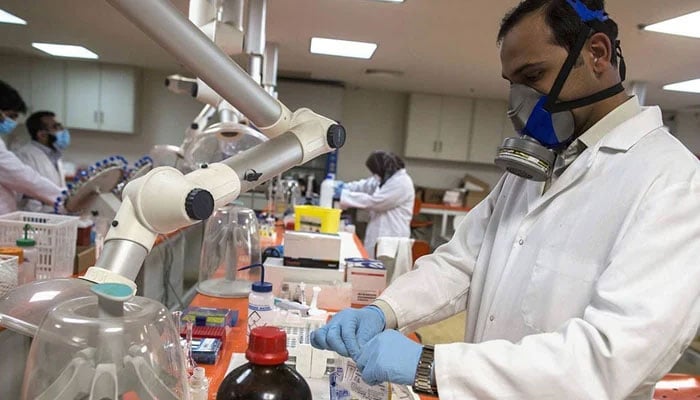Without ‘buyback guarantee’ pharma firms won’t invest in vaccine production: officials
DRAP officials clarify while their role is regulatory facilitation, responsibility for vaccine development lies with NIH and private sector
ISLAMABAD: Without “buyback guarantees” from government of Pakistan, local pharmaceutical industry is unwilling to invest in indigenous vaccine production, as the process requires multimillion-dollar investments, officials and industry sources told The News.
Despite an annual expenditure of around Rs67 billion on vaccine procurement — currently co-financed by domestic budgets and Gavi, Vaccine Alliance — Pakistan remains heavily dependent on foreign vaccine manufacturers.
With Gavi’s support set to end by 2029, the entire financial burden of immunisation will shift to Pakistan’s federal and provincial governments, raising serious questions about sustainability and self-reliance. Yet, not a single local pharmaceutical company has stepped forward to invest in full-scale vaccine development.
Officials in Ministry of National Health Services, Regulations and Coordination (NHS,R&C) and Drug Regulatory Authority of Pakistan (DRAP) said vaccine production is a high-risk venture that demands substantial capital, cutting-edge technology transfers from abroad, trained human resources, cold-chain infrastructure, clinical trials and global quality certifications.
“No Pakistani pharmaceutical firm is willing to commit to large-scale vaccine production unless the government guarantees to buy their product”, a senior Health Ministry official said. Unfortunately, he said, for the last 10 years, successive governments have refused to provide such sovereign guarantees.
These guarantees, officials argue, are essential because the cost of domestically produced vaccines will be higher in the initial years. However, Pakistan’s current procurement rules only allow purchase of lowest-cost bids — usually offered by established multinational vaccine producers. This creates a structural disincentive for local manufacturers, who fear being priced out despite their investments.
“There is also an ever-present fear of accountability organizations”, official said. If a government official signs a procurement deal at a higher price to support local production, they fear being dragged into inquiries or anti-corruption proceedings, he added.
DRAP officials clarified while their role is regulatory facilitation, responsibility for vaccine development lies with National Institute of Health (NIH) and the private sector. “We are in talks with several international organisations to help build Pakistan’s vaccine production capacity. But ultimately, private sector must lead with government incentives”, a senior DRAP official said.
The absence of a comprehensive national strategy, funding commitments, or enabling regulatory policies has left Pakistan vulnerable. No locally produced therapeutic product except four medicines have received WHO prequalification, making them ineligible for international tenders floated by global procurement agencies such as Unicef or the Global Fund.
The urgency is mounting. Pakistan’s Expanded Programme on Immunisation (EPI) currently provides vaccines for over 10 diseases, including polio, measles, tuberculosis and hepatitis B. High-value vaccines like pneumococcal conjugate (PCV) and pentavalent vaccines are largely subsidised by Gavi. But, with Gavi’s exit nearing, Pakistan must prepare to shoulder the full cost or risk major setbacks in its immunisation efforts.
To mitigate the looming crisis, Pakistani health authorities have begun exploring international partnerships. During a recent visit to Bali for 9th Asia Pacific Leaders’ Summit on Malaria Elimination, Federal State Minister for Health Dr Mukhtar Ahmed Bharath held discussions with his Indonesian counterpart Budi Gunadi Sadikin on joint vaccine production.
“Indonesia is performing impressively in vaccine manufacturing, and we are exploring ways to partner with them to establish a vaccine production facility in Pakistan”, Dr Bharath said.
Health experts warn unless Pakistan seizes this opportunity to build local capacity, it may find itself unable to afford critical vaccines after Gavi exits, leading to disease outbreaks, wastage of vaccine stocks, and further pressure on already fragile health system.
“Vaccine development isn’t just a scientific endeavour — it’s a political, economic and governance challenge”, a senior DRAP official emphasised. He said it requires a top-level, multi-stakeholder commitment, involving policy reforms, ease of doing business, international cooperation, and most critically, government-backed assurances to local industry. Until that happens, Pakistan’s dream of vaccine self-sufficiency will remain just a dream, he observed.
Chairman of Pakistan Pharmaceutical Manufacturers Association (PPMA), Tauqeer-ul-Haq, echoed the concerns of industry leaders, saying no private firm would risk investing millions of dollars in vaccine production without a firm buyback guarantee from government.
“Vaccines are not over-the-counter products that can be sold in pharmacies or medical stores. They are procured almost exclusively by the governments. Without assurance of purchase, private sector simply won’t take the plunge”, he said.
Tauqeer-ul-Haq said a well-structured Public-Private Partnership (PPP) model is the most viable way forward, where the government provides an enabling environment, fiscal incentives and regulatory support to kickstart domestic vaccine development and ensure its sustainability.
-
 HBO Mulls Major 'Game Of Thrones' Spin-off Focusing On A Stark
HBO Mulls Major 'Game Of Thrones' Spin-off Focusing On A Stark -
 Ashton Kutcher Says He's Proud Of Demi Moore
Ashton Kutcher Says He's Proud Of Demi Moore -
 Why Prince William, Kate Hired A Crisis Expert Despite Royal 'calm'?
Why Prince William, Kate Hired A Crisis Expert Despite Royal 'calm'? -
 Extent Of Meghan Markle’s Fears Gets The Spotlight: ‘The Press Detest Her Which Is A Problem’
Extent Of Meghan Markle’s Fears Gets The Spotlight: ‘The Press Detest Her Which Is A Problem’ -
 Caitlyn Jenner Finally Reacts To Kylie, Timothee Chalamet Relationship
Caitlyn Jenner Finally Reacts To Kylie, Timothee Chalamet Relationship -
 Prince William’s Beefed Up PR All Set To Fight Off ‘plot’ And ‘it Might Not Be Long’
Prince William’s Beefed Up PR All Set To Fight Off ‘plot’ And ‘it Might Not Be Long’ -
 Kate Middleton Ups A New Role Unofficially For King Charles As William Prepares His Coronation
Kate Middleton Ups A New Role Unofficially For King Charles As William Prepares His Coronation -
 Teyana Taylor Says She Misread Leonardo DiCaprio Globes Moment
Teyana Taylor Says She Misread Leonardo DiCaprio Globes Moment -
 A$AP Rocky Reveals What Encouraged Him To Date Rihanna
A$AP Rocky Reveals What Encouraged Him To Date Rihanna -
 Newborns At Risk: Health Experts Warn Your Baby Could Already Have Diabetes
Newborns At Risk: Health Experts Warn Your Baby Could Already Have Diabetes -
 Sarah Ferguson Updates Her Plans Now That Andrew’s Eviction Is Nine Days Away
Sarah Ferguson Updates Her Plans Now That Andrew’s Eviction Is Nine Days Away -
 Hailey Bieber Sends Cease And Desist To TikToker
Hailey Bieber Sends Cease And Desist To TikToker -
 Kate Middleton Celebrates England Women's Rugby Stars After World Cup Win
Kate Middleton Celebrates England Women's Rugby Stars After World Cup Win -
 Kris Jenner Dubs Chicago West Her 'sweet Angel' As She Turns Eight
Kris Jenner Dubs Chicago West Her 'sweet Angel' As She Turns Eight -
 Josh Charles Credits Taylor Swift For His, Ethan Hawke’s Moon Person Trophies
Josh Charles Credits Taylor Swift For His, Ethan Hawke’s Moon Person Trophies -
 Jodie Foster Voices Opinion About 'misogyny'
Jodie Foster Voices Opinion About 'misogyny'




